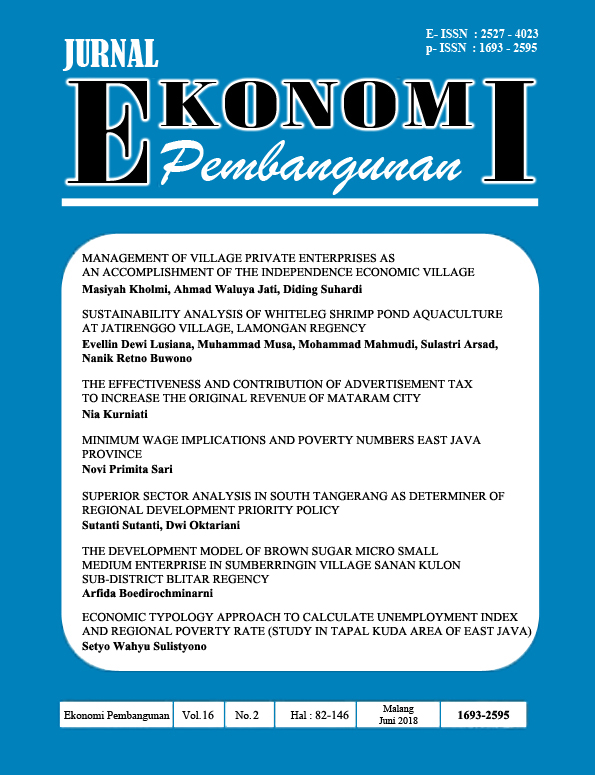SUPERIOR SECTOR ANALYSIS IN SOUTH TANGERANG AS DETERMINER OF REGIONAL DEVELOPMENT PRIORITY POLICY
DOI:
https://doi.org/10.22219/jep.v16i2.9069Keywords:
featured sector, location quotient (LQ), shift - share analysis, GRDPAbstract
The important thing for regions that have not been recently established such as South Tangerang City is sustainable economic growth. This study aims to identify and analyze the leading sectors in South Tangerang and to project the South Tangerang City Gross Domestic Product in 2017. The data used in the form of the total value added of goods and services resulting from all the economic activities of South Tangerang City and Banten Province economists based on constant prices in 2000. The analysis method uses the Location Quotient (LQ) model and Shift - Share analysis. Based on the Location Quotion (LQ) method, the base sector is nine sectors, namely (1) the Construction Sector; (2) The sector of large and retail trade, and repair of cars and motorbikes; (3) the sector of providing accommodation and drinking meals; (4) information and communication sector; (5) real estate sector; (6) company service sector; (7) educational services sector; (8) health services sector and social activities; (9) other service sectors. Overall, South Tangerang City has the most superior sector in the real-estate sector. It can be concluded that this sector has a competitive advantage and comparative advantage.
Downloads
References
Adisasmita, R. 2005. Dasar-dasar Ekonomi Wilayah. Yogyakarta: Penerbit Graha Ilmu.
Armida, S Alisyahbana. 2000. Desentralisasi Fiskal dan Kebijakan Pembangunan Ekonomi Daerah: Makalah disampaikan pada kongres ISEI XIV, 21-23 April, di Makasar.
Arsyad, Lincolin. 1999. Ekonomi Pembangunan. Yogyakarta: STIE YKPN.
Fadillah, Uray Muhammad Taufan. 2016. Analisis Sektor Unggulan di Kota Tangerang Selatan. Semarang: Universitas Diponegoro.
Kajian Ekonomi dan Keuangan Regional Provinsi Banten November 2017. Kantor Perwakilan Bank Indonesia Provinsi Banten.
Kota Tangerang Selatan Dalam Angka 2018. Katalog: 1102061. ISSN 2085-6059. BPS Kota Tangerang Selatan.
Jamillia, Jelita Septina. 2011. Studi Pengembangan Wilayah Kota Tangerang Selatan Melalui Pendekatan Sektor-Sektor Unggulan. Jakarta: Universitas Islam Negeri Syarif Hidayatullah.
PDRB Kota Tangerang Selatan Menurut Lapangan Usaha 2013-2017. Katalog: 9302021.3674. ISSN: 2089-4643. BPS Kota Tangerang Selatan.
Tarigan, Robinson. 2012. Ekonomi Regional, Teori dan Aplikasi. Edisi Revisi, Cetakan Keenam. Jakarta: PT. Bumi Aksara.
Sjafrizal. 2008. Ekonomi Regional, Teori dan Aplikasi. Cetakan Pertama. Padang: Baduose Media.
Sukirno, Sadono. 1999. Ekonomi Pembangunan. Jakarta: Bina Grafika.
Supangkat, Harlan. 2002. Analisis Penentuan Sektor Prioritas dalam Peningkatan Pembangunan Daerah Kabupaten Asahan dengan menggunakan Pendekatan Sektor Pembentuk PDRB. Medan: Universitas Sumatera Utara.
Suyatno. 2000. Analisa Econimic Base terhadap Pertumbuhan Ekonomi Daerah Tingkat II Wonogiri: Menghadapi Implementasi UU No. 22/1999 dan UU No. 25/1999. Jurnal Ekonomi Pembangunan Vol. 1. No. 2. Hal. 144-159. Surakarta: Universitas Muhammadiyah Surakarta.
Statistik Daerah Kota Tangerang Selatan 2016. Katalog: 36740-1503. ISSN: 2089.4600. BPS Kota Tangerang Selatan.
https://chenhawoey.wordpress.com/2012/05/06/gambaran-umum-kota-tangerang-selatan/
Downloads
Published
Issue
Section
License
Authors who publish with Jurnal Ekonomi Pembangunan (JEP) agree to the following terms:
- For all articles published in Jurnal Ekonomi Pembangunan (JEP), copyright is retained by the authors. Authors permit the publisher to announce the work with conditions. When the manuscript is accepted for publication, the authors agree to the publishing right's automatic transfer to the publisher.
- Authors retain copyright and grant the journal right of first publication with the work simultaneously licensed under a Creative Commons Attribution-NonCommercial-ShareAlike 4.0 International License that allows others to share the work with an acknowledgment of the work's authorship and initial publication in this journal.
- Authors can enter into separate, additional contractual arrangements for the non-exclusive distribution of the journal's published version of the work (e.g., post it to an institutional repository or publish it in a book), with an acknowledgment of its initial publication in this journal.
- Authors are permitted and encouraged to post their work online (e.g., in institutional repositories or on their website) before and during the submission process, as it can lead to productive exchanges and earlier and greater citation of published work (See The Effect of Open Access).

This work is licensed under a Creative Commons Attribution-NonCommercial-ShareAlike 4.0 International License.






















